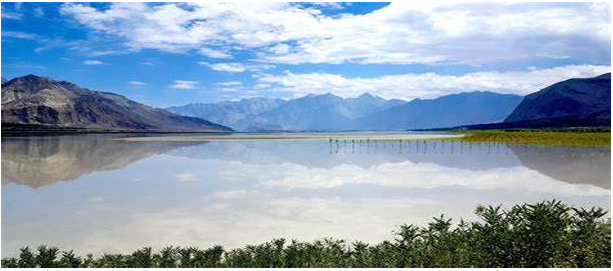i INP-WEALTHPK
Azeem Ahmed Khan
India's suspension of the Indus Waters Treaty (IWT) through unilateral action threatens Pakistan's agricultural sector along with the economy and food security, cautioned Dr Moazzam Hashmi, a security and political analyst and Adjunct Faculty at Quaid-i-Azam University, Islamabad.

Talking to WealthPK, he warned that severe cuts in Indus River water and its main tributaries would make Pakistan unable to maintain agricultural output, threatening both exports and financial stability. “Water is a fundamental pillar supporting Pakistan’s economic infrastructure since agriculture employs 37.4% of the workforce while providing 24% of GDP,” said Hashmi, who is also a veteran journalist with specialisation in conflict and counterterrorism studies.
Punjab and Sindh, where the country’s key crops are grown, depend on irrigation to cultivate water-demanding crops, including wheat, rice, sugarcane, and cotton, Hashmi said. According to him, the interruption of water flow from the Indus, Jhelum, and Chenab rivers would create catastrophic effects on crop production, exacerbating food scarcity. “These rivers serve dual purposes as a source of power for hydroelectric production, together with their fundamental role in irrigation functions,” he said.
“The Mangla and Tarbela dams are fed by streaming river water, while Pakistan also operates the world's largest man-made canal system, which depends on this flowing water,” he added. The security and political analyst cautioned that Pakistan currently ranks among the top 10 water-deficient nations worldwide, and the situation will degrade severely whenever river stream levels decrease.
He warned that water scarcity will replace water stress due to Pakistan’s inefficient irrigation practices, restricted storage solutions, excessive groundwater extraction, and a high population. The expert emphasised that water has advanced to a national security status due to its economic value. “The developing water emergency threatens to curtail exports and weaken Pakistan's main earnings sector – the textile industry.”
“The decline in agricultural yield would trigger inflationary pressures which would worsen poverty conditions for impoverished families,” he pointed out. Hashmi predicted that lower farm income levels would further accelerate the process of rural population shifts to urban areas, which would make city infrastructure and service systems more strained. “Any food scarcity in Pakistan will compel the nation to acquire essential food items through imports, thus depleting available foreign exchange reserves and widening the trade deficit,” he added.
Meanwhile, Wajih Abbasi, a lawyer and political analyst, told WealthPK that Pakistan depends on the Indus Basin for meeting over 80% of its irrigation requirements. “The water shortage predicament in Punjab and Sindh risks intensification from any Indian intervention,” he warned. “Under the Indus Waters Treaty provisions, India needs to share hydrological data with Pakistan so Islamabad can predict floods and execute agricultural plans and advance hydropower initiatives while managing its water supply system,” he said.
“But the halt in data exchange would further endanger Pakistan's hindering water conditions and damage its agricultural industry,” he added. “Pakistan views India’s unilateral suspension of the decades-old Indus Waters Treaty as hostile and equal to waging war on its territory,” he stated.
“The upstream control that India exercises over dams presents new potential dangers,” he noted. “The sudden discharge of water acts as a 'water bomb', which can produce massive detrimental effects across Pakistan's downstream territory,” he added.
Abbasi said this agreement has no provision for unilateral suspension since it requires such cancellations through mutual consent from both sides. “Any independent decision by India to suspend or withdraw from the treaty goes against explicit treaty provisions while violating essential international law principles,” he pointed out.
The World Bank is the guarantor of the 1960 Indus Waters Treaty, which functions as an international law-based agreement for water distribution between Pakistan and India, Abbasi said. “The treaty allocated India ownership of the rivers Ravi and Beas as well as Sutlej while granting Pakistan possession of around 80% of the water from the western rivers – Indus, Jhelum, and Chenab,” he added.
Credit: INP-WealthPk



